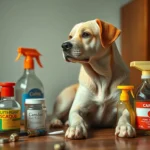
Introduction
When it comes to our furry companions, ensuring their health and well-being is of utmost importance. Just like humans, dogs require proper care to thrive, especially during their formative years. Among the myriad of topics concerning dog health care, one that often raises questions is related to puppies and their chewing habits. Can puppies chew on bones? This question is frequently posed by new dog owners who want to provide the best for their pets. Understanding the answers to this question can help guide puppy health care, especially in terms of safe chewing practices.
Understanding Puppy Development
Stages of Puppy Growth
Puppy development is a fascinating journey that can be divided into several key stages:
-
Neonatal Stage (0-2 weeks): During this period, puppies are completely dependent on their mother. They are born blind and deaf, relying on touch and smell.
-
Transitional Stage (2-4 weeks): Puppies begin to open their eyes and ears, marking the start of sensory development. They become more mobile and start exploring their surroundings.
-
Socialization Stage (4-12 weeks): This crucial period is when puppies learn about their environment and socialize with humans and other animals. Proper exposure during this phase can lead to well-adjusted adults.
-
Juvenile Stage (3-6 months): Puppies continue to grow, and their personalities start to emerge. They begin teething, which is often accompanied by a desire to chew on various objects.
Understanding these stages is essential for puppy health care, as each phase requires different types of support, including nutritional guidance and behavioral training.
Dental Development in Puppies
Puppy dental development typically follows a predictable timeline:
-
Deciduous Teeth: Puppies are born without teeth. The first set of baby teeth usually appears around 2 to 3 weeks of age, consisting of 28 teeth.
-
Teething Phase: By 3 to 6 months, puppies will begin to lose their baby teeth as their adult teeth start to emerge. This process can be uncomfortable, leading to increased chewing behavior.
Common teething issues include sore gums and irritability. To alleviate discomfort, owners can provide appropriate chew toys, which help soothe sore gums and promote healthy dental development.
The Role of Chewing in Puppy Health
Natural Instincts and Chewing
Chewing is a natural instinct for puppies, serving several important functions:
-
Exploration: Puppies use their mouths to explore their environment, much like infants do.
-
Mental Stimulation: Chewing helps stimulate a puppy’s brain, reducing boredom and anxiety.
-
Dental Health: Regular chewing promotes healthy teeth and gums, helping to prevent plaque buildup.
Chewing can also provide comfort during the teething phase, allowing puppies to relieve discomfort naturally.
Types of Chewables
When considering chewable items for puppies, it’s essential to differentiate between safe and unsafe options.
Safe Chewables:
- Rubber Toys: Durable and often designed for heavy chewing.
- Raw Meaty Bones: When supervised, these can be beneficial for dental health.
- Natural Chews: Options like bully sticks or dental chews made from safe ingredients.
Unsafe Chewables:
- Cooked Bones: They can splinter and pose choking hazards.
- Toys with Small Parts: These can be swallowed or choked on.
- Human Food: Items like chocolate and grapes are toxic to dogs.
Choosing the right chewable items is crucial for ensuring a puppy’s safety while allowing them to satisfy their natural chewing instincts.
Can Puppies Chew on Bones?
Types of Bones Safe for Puppies
When it comes to the question, can puppies chew on bones, the answer is nuanced. Not all bones are created equal. Here’s a breakdown of safe options:
-
Raw Bones: Generally considered safe as they do not splinter as easily as cooked bones. Popular options include raw meaty bones and knuckle bones, which can provide both nutrition and chewing satisfaction.
-
Recreational Bones: These are larger bones that are meant for chewing rather than consumption. They typically have a lot of bone matrix and marrow, which can be beneficial.
-
Raw Meaty Bones: These are bones that still have meat attached. They can provide essential nutrients while also serving as a chewable item.
Risks Associated with Bone Chewing
While there are benefits to bone chewing, it’s important to be aware of the potential risks:
-
Choking Hazards: Puppies can easily choke on small pieces of bone, which can result in serious injury or even death.
-
Splintering: Cooked bones, in particular, can splinter, leading to sharp shards that can injure a puppy’s mouth, throat, or intestines.
-
Dental Damage: Chewing too aggressively on hard bones can lead to broken teeth, which may require veterinary intervention.
Signs of distress or injury when chewing on bones include excessive drooling, difficulty eating, vomiting, or any signs of discomfort. If you notice these symptoms, it’s crucial to consult a veterinarian immediately.
Expert Recommendations
Veterinarians often provide guidelines for bone chewing in puppies. Here are some common recommendations:
-
Supervise Bone Chewing: Always monitor your puppy while they chew on bones to intervene in case of any issues.
-
Opt for Raw Bones: If you choose to give bones, raw bones are generally safer than cooked ones.
-
Limit Bone Chewing Time: Allow your puppy to chew for a limited time to prevent excessive wear on their teeth.
-
Consider Alternatives: There are numerous safe chew toys available that can provide similar benefits without the risks associated with bones.
Best Practices for Puppy Chewing
Supervision and Training
Supervision is paramount when it comes to puppy chewing. Here are some tips for effective supervision and training:
-
Monitor Chewing Sessions: Always be present when your puppy is chewing on bones or toys. This allows you to intervene if any issues arise.
-
Train Appropriate Chewing Behavior: Redirect your puppy to safe chew toys if they start chewing on inappropriate items. Positive reinforcement can help encourage desirable chewing habits.
Choosing the Right Chewables
Selecting appropriate chewables based on your puppy’s size and breed is crucial. Here are some considerations:
-
Size Matters: Choose chew toys that are appropriate for your puppy’s size to prevent choking hazards.
-
Material Quality: Look for high-quality, durable chew toys that can withstand heavy chewing without breaking apart.
-
Taste and Texture: Some puppies have preferences when it comes to taste and texture. Experiment with different types of chewables to see what your puppy enjoys.
Maintaining Overall Puppy Health
Regular Veterinary Check-ups
Routine veterinary check-ups are critical for maintaining your puppy’s health. Regular visits allow for:
-
Vaccinations: Keeping your puppy up to date on vaccinations protects against various diseases.
-
Parasite Control: Regular deworming and flea prevention help keep your puppy healthy.
-
Dental Care: Regular dental check-ups can prevent oral health issues and promote healthy teeth and gums.
Nutrition and Exercise
A balanced diet and regular exercise are vital for a puppy’s overall health. Here are some essential tips:
-
Nutrition: Choose high-quality puppy food that meets their nutritional needs. Consult your veterinarian for recommendations based on your puppy’s breed and size.
-
Exercise: Daily exercise is crucial for physical and mental health. Engage in activities like walks, playtime, and socialization with other dogs.
Socialization and Mental Stimulation
Socialization is an essential aspect of puppy health care. Here’s how to enhance socialization and mental stimulation:
-
Expose to Different Environments: Introduce your puppy to various settings, people, and other animals to build confidence and reduce anxiety.
-
Interactive Games: Engage in games that stimulate your puppy’s mind, such as puzzle toys or hide-and-seek.
-
Training Classes: Consider enrolling your puppy in training classes where they can learn obedience and socialize with other dogs.
Conclusion
In summary, ensuring the health and well-being of puppies involves understanding their developmental stages, the importance of chewing, and the answer to the question, can puppies chew on bones? While chewing is a natural instinct that promotes dental health and mental stimulation, safety should always be a priority. By following expert recommendations, maintaining regular veterinary care, and providing a balanced diet and exercise, you can help your puppy grow into a healthy and happy adult dog.
As a responsible pet owner, it’s essential to stay informed and consult with your veterinarian for personalized advice tailored to your puppy’s needs. By prioritizing proper chewing habits and overall health care, you can ensure a fulfilling and joyful life for your furry companion.









